- Home
- Will McIntosh
The Future Will Be BS Free
The Future Will Be BS Free Read online
ALSO BY WILL MCINTOSH
Burning Midnight
Watchdog
This is a work of fiction. Names, characters, places, and incidents either are the product of the author’s imagination or are used fictitiously. Any resemblance to actual persons, living or dead, events, or locales is entirely coincidental.
Text copyright © 2018 by Will McIntosh
Cover design by Neil Swaab
Cover illustrations © 2018 by Jacob Thomas
Excerpt from Burning Midnight copyright © 2016 by Will McIntosh
All rights reserved. Published in the United States by Delacorte Press, an imprint of Random House Children’s Books, a division of Penguin Random House LLC, New York.
Delacorte Press is a registered trademark and the colophon is a trademark of Penguin Random House LLC.
Visit us on the Web! GetUnderlined.com
Educators and librarians, for a variety of teaching tools, visit us at RHTeachersLibrarians.com
Library of Congress Cataloging-in-Publication Data
Name: McIntosh, Will, author.
Title: The future will be BS-free / Will McIntosh.
Description: First edition. | New York : Delacorte Press, [2018] | Summary: Seventeen-year-old Sam and his friends find themselves on the run after exposing their corrupt government using a highly-effective lie-detector they invented.
Identifiers: LCCN 2017025279 | ISBN 978-0-553-53414-6 (hc) | ISBN 978-0-553-53415-3 (el)
Subjects: | CYAC: Political corruption—Fiction. | Lie detectors and detection—Fiction. | Inventions—Fiction. | Friendship—Fiction. | Single-parent families—Fiction. | Dystopias—Fiction. | Science fiction.
Classification: LCC PZ7.1.M4353 Fut 2018 | DDC [Fic]—dc23
Ebook ISBN 9780553534153
Random House Children’s Books supports the First Amendment and celebrates the right to read.
v5.3.1
ep
Contents
Cover
Also by Will McIntosh
Title Page
Copyright
Dedication
Chapter 1
Chapter 2
Chapter 3
Chapter 4
Chapter 5
Chapter 6
Chapter 7
Chapter 8
Chapter 9
Chapter 10
Chapter 11
Chapter 12
Chapter 13
Chapter 14
Chapter 15
Chapter 16
Chapter 17
Chapter 18
Chapter 19
Chapter 20
Chapter 21
Chapter 22
Chapter 23
Chapter 24
Chapter 25
Chapter 26
Chapter 27
Chapter 28
Chapter 29
Chapter 30
Chapter 31
Chapter 32
Chapter 33
Chapter 34
Chapter 35
Chapter 36
Chapter 37
Chapter 38
Chapter 39
Chapter 40
Chapter 41
Chapter 42
Chapter 43
Chapter 44
Chapter 45
Chapter 46
Chapter 47
Chapter 48
Chapter 49
Chapter 50
Chapter 51
Chapter 52
Acknowledgments
Excerpt from Burning Midnight
About the Author
To Joy Marchand Davis, book whisperer, who made this, and pretty much everything I’ve written, much better than it otherwise would have been
I stood in the middle of Rebe’s garage and took it all in. It was really happening. This wasn’t a school project, or a game—this was real. And it. Was. Awesome.
Boob and Basquiat were hunched over a pair of linked PCs propped on the workbench. Rebe was typing frantically as lines of code appeared in the air in front of her. Molly was poring over brain scans. All I could see of Theo were his black hiking shoes and the cuffs of his brown corduroys sticking out of the MRI machine that took up most of one whole bay. Deathblow was blaring from Rebe’s portable stereo, the accompanying holographic video flashing above it.
We’d been working on the project for five months, but now that school was out, we were making serious progress.
Boob noticed me watching him. “You going to actually, you know, do something?”
“I am doing something,” I shot back. “I’m supervising.” I clenched my brow and folded my arms across my chest, striking a supervisory pose.
“Why don’t you go supervise me some lightning juice if you don’t have anything better to do.”
I tried to think of a witty reply, but nothing came, so I fetched Boob a can of Vitnik Energy Drink from a Styrofoam cooler half-filled with tepid water and a few drowned bugs. Someone had mercifully peeled the labels off the cans, so I didn’t have to see President Vitnik’s face. The only reason we bought the energy drink was because Vitnik products were the cheapest, and tax-free, to boot.
Rebe raised her hands in the air as Blacklight pulsed in the background. “I’m in. Oh, baby.”
I went and looked over her shoulder. “Terrific. In where?”
“The quantum processor at MIT. We still need more processing power, so I’m borrowing a little corner of MIT’s processor that they’re not using.”
I patted her back. “Nice.” Okay, borrow was probably not the most accurate word for what she was doing, but if we were going to do this, we needed to get creative.
The door to Rebe’s kitchen flew open. “Dinner!” Rebe’s mom screamed at her.
“Okay!” Rebe screamed back.
Rebe’s family seemed to communicate solely by screaming at each other. They didn’t seem mad, they just had issues with volume. No matter how loud she screamed, though, Rebe’s mom was one of my all-time favorite people, and not just because she was letting us use her garage as our workshop.
“You guys can keep working,” Rebe said as she climbed the concrete steps. “I’ll be back in twenty minutes.” She didn’t need to tell us that. Unless her mom screamed at us to go home, nothing would stop us from working until curfew forced us to stop. It wasn’t like we had school tomorrow—school had ended two weeks early due to lack of funds. And it wasn’t like we had anywhere else to go, since we were all suffering from a severe lack of funds ourselves.
Theo inched his way out of the MRI tube. It was a struggle for him to navigate the tight space because of his cerebral palsy. He was incredibly self-conscious about it, though its effects weren’t as noticeable as he seemed to think. Theo walked with a limp, and his left hand was stiff and tended to curl in when he wasn’t using it. That was about the extent of it.
Theo sighed mournfully, perched on the edge of the MRI machine. “We’re never going to be able to make it small enough without a SQUID, and access to a 3-D printer.”
Superconducting quantum interference devices were supersensitive detectors that could produce brain images using ultralow magnetic fields, which were the only kind you co
uld generate from a distance.
“We’ll figure it out,” I said.
Theo nodded skeptically.
“I don’t want to be the pin in our balloon, but any idea how we’re going to figure it out?” Basquiat asked.
“ ‘The pin in our balloon’?” Boob said. “Is that a Caribbean saying?”
Basquiat gave him a look. “It’s not a saying. I just made it up.” He turned back to me. “So?”
Everyone had stopped what they were doing. All eyes were on me. “I mean, once we have the prototype, I’m going to find an investor for us to partner with us. Until then…” I hesitated, because I knew they weren’t going to like my solution. “We sell everything we own if we have to.”
Everyone started talking and howling and whining at once.
“I’m not selling my car,” Boob said over the cacophony. “Don’t even go there.”
Boob’s father had passed the Harley Air on to Boob when the lung damage he’d sustained from inhaling vermillion gas during the war finally caught up with him. Selling it could bring in two-thirds of the money we needed.
Good old Mr. Kong. I missed him. When Boob was born, Mr. Kong was so excited and exhausted that when he filled out the birth certificate, he added an extra o to Bob. Eventually the mistake got fixed, but of course when people at school found out, everyone started calling Boob, Boob. Looking back on it now, it seems mean, but we were all so young the sting’s worn out of it.
Boob was laying out reason number six or seven for why he wasn’t selling his car when Molly cut him off.
“Do you really believe we can do this?” Molly asked him. “Because if we’re just playing at this, I don’t want to sell my things, either. In fact, I don’t want to waste my time working on this at all.” She shook her head. “There are a lot of things I’d rather be doing. But if we’re serious? What’s a few junkers and skis and stuff compared to the kind of money we’re talking about?”
Boob had been shaking his head through Molly’s entire speech. “I’m not selling my car.”
“When we’re up and running, I’ll buy you a Tesla seven,” I said. It was hard to imagine being able to afford a Tesla in today’s tar pit of an economy, but if we could pull this off, I would.
Boob made a chopping gesture with one hand. “Fine, if I sell my car, and all you’re selling are some comic books and sweatshirts you don’t wear anymore, I get more shares in the company.”
“No. No one gets more than anyone else. We’re even partners,” Theo said.
Boob gave an exasperated huff. “Of course you’re going to say that, you socialist.” He turned back to his work. I wasn’t sure whether that meant he was agreeing to sell his car or digging in his heels.
“It’s probably a good thing we’re running into this problem before we sink any more time into this project,” Molly said. “This is a good test.”
I caught Molly’s eye and nodded a silent thank you for her backing me. She smiled and turned to the workbench.
Because Molly was smallish and a little mousy-looking, with sparkly brown eyes behind black-rimmed glasses, guys tended to think she was sweet and approachable. But scratch the surface and you discovered a woman who would gladly hand you your nuts, still smiling sweetly, eyes still sparkling, if you pissed her off.
I was so madly in love with her it was ridiculous.
“And if we are serious, remember: no talking about the project with anyone but the people we agreed on,” Theo said. “And don’t discuss it in public places.”
“Right,” Boob said. “We wouldn’t want the employees at Taco Bell stealing our idea.”
“You never know who’s monitoring a surveillance camera remotely,” Theo said as he climbed back into the MRI. Looking at that big, clunky machine always set my heart fluttering with anticipation.
When Mr. Chambliss discovered an old MRI machine that Nyack Hospital had donated to the school, he’d made it our focus. Soon it was more than our focus—it was our obsession. We learned how it worked, how to repair it, how to read the brain and body images it spit out. We wrote programs to make interpreting the output easier. Hell, Theo learned to take it apart and reassemble it in two hours.
When Theo got interested in something, he grabbed onto it like a pit bull latching onto an ankle and didn’t let go until he knew everything about it. Then he’d insist on telling you every single thing he’d learned in a flat monotone.
I can still remember the rush I got when Theo told us his Big Idea. The first piece came from something Molly had learned in the online neuropsychology class she was taking. Neuroscientists had identified a part of the brain whose sole purpose was to create and manage lies. You have to manage your lies, because once you tell one, you have to keep track of it—who you told it to, how it meshes with the factual details of your life. The key to it all is handling inconsistency, and that, in a nutshell, is what the anterior cingulate cortex does.
The other piece of the puzzle came from Mr. Chambliss, our advisor in the Science and Technology Scholar Program, who told us about a breakthrough in weak magnetic field imagery that made it possible to record someone’s brain activity without sticking them in an MRI tube for twenty minutes.
One day in April, Theo came bursting into the cafeteria, red-faced with excitement. He’d put it all together. The magnetic field breakthrough meant you could theoretically measure anterior cingulate cortex activity from a distance. And if you could do that, what do you have?
A lie detector. A cheap, portable lie detector.
And not some garbage heart-rate-based polygraph that is sort of, maybe right some of the time, but a lie detector that peels back your skull and peers directly at your brain. A lie detector that’s right all the time.
Eventually someone else would connect the same dots, or come up with a different way to do the same thing. We needed to have a prototype finished before they did. And we were just the people who could pull it off on a shoestring budget in a garage. At least, I thought we were. Yes, we were still in high school, but when we weren’t working with Mr. Chambliss, we were working on online graduate courses in our specialty areas.
“I can’t wait till we’re finished and I get my hands on one of these,” Molly said as she fed the latest batch of MRI scans we’d conducted on our own brains into the ever-growing database. “It’s going to show that people who have out-of-body experiences, see ghosts, and sense the future aren’t lying. And if they’re not lying, there aren’t a whole lot of other explanations for what they experience.”
Unless you counted wishful thinking and delusions. It was weird—other people who believed in the paranormal annoyed me, and I tended to avoid them, but I found Molly’s belief endearing. Misguided, but endearing.
The Blacklight album ended, and the garage was suddenly quiet.
“My turn,” said Theo, who was again buried head to ankles in the MRI tube, his voice muffled. He squeezed out to pick music as Boob and Basquiat groaned in unison.
“Please. Nothing depressing,” Basquiat said.
Theo stood at the stereo and scrolled through the esoteric music collection on his phone. He loved old, depressing music. Eighties goth. Country western from the fifties.
“Ah.” Theo touched the phone on his wrist to the stereo’s port and turned on what sounded like a bunch of musicians tuning their instruments.
“What is that?” Boob asked, scowling.
“Jazz fusion,” Theo said.
“It sucks.”
The door opened and Rebe rejoined us. “What did I miss?”
A couple of us laughed.
“What?” Rebe asked, hands on hips.
“Anything you own that’s got any value at all?” Basquiat said. “Kiss it goodbye. You’re selling it.”
Rebe shrugged. “I’m good with that. You gotta spend money to make money.”<
br />
I held out my fist as Rebe passed. She gave it a bump.
“Hey.” Rebe paused. “We could have a garage sale.”
The sun was setting as the long, smooth concrete wall of Clarkstown Heights came into view. Seventeen minutes until curfew. I would make it home with about ten minutes to spare, but I had cut it close trying to squeeze every minute out of the workday. I turned right on the path around the wall’s perimeter. I could remember the time before the wall was built, when Clarkstown Heights was nothing but a little gated neighborhood. Now it was an entire town inside a town, with its own stores, doctors, schools, and police, and the only movie theater within twenty miles. Plus, it didn’t have a curfew. I’d only been inside twice, invited by Devon Walsh, a kid I was friends with when we were four. It had been like stepping into the future. Devon watched TV in a seat that turned three hundred sixty degrees as holographic characters moved around in a 3-D background that stretched past the room’s walls to a virtual horizon.
No one in Clarkstown Heights had a foolproof lie detector, though.
I slowed as I reached the collapsed overpass that used to cross Route 304. The debris had been cleared away so traffic could flow, but they’d never replaced the overpass. No funds. Same story with the Bear Mountain Bridge, and a thousand other collapsed bridges and overpasses across the country. No funds. Nothing got painted or cleaned or repaired anymore. The world got older and uglier each day.

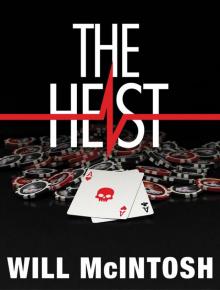 The Heist
The Heist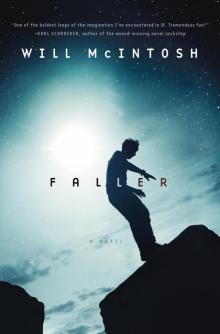 Faller
Faller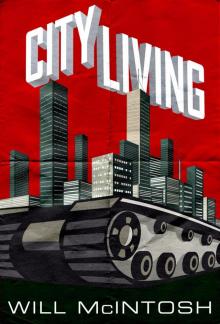 City Living
City Living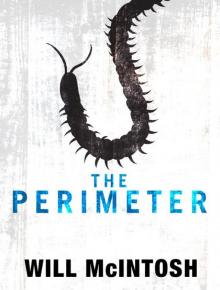 The Perimeter
The Perimeter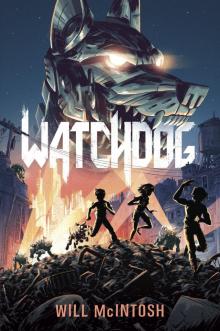 Watchdog
Watchdog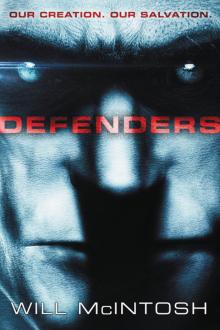 Defenders
Defenders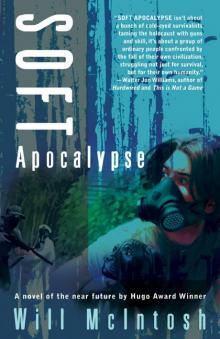 Soft Apocalypse
Soft Apocalypse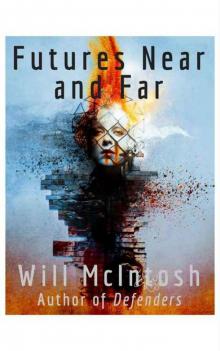 Futures Near and Far
Futures Near and Far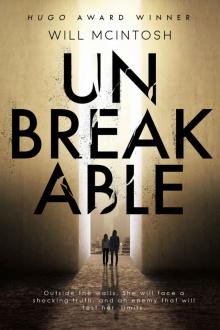 Unbreakable
Unbreakable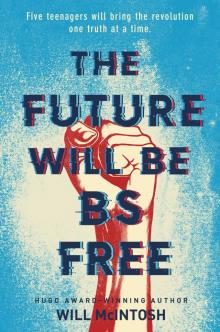 The Future Will Be BS Free
The Future Will Be BS Free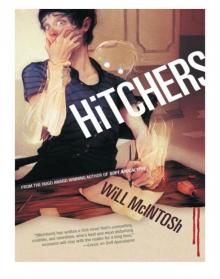 Hitchers
Hitchers Burning Midnight
Burning Midnight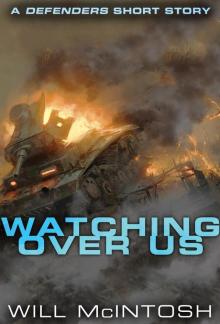 Watching Over Us
Watching Over Us